Every time I go to the beach, I love to walk along the shoreline to see what may have washed up from the ocean – usually several beautiful shells, oftentimes sargassum seaweed, maybe even part of a crab exoskeleton. Unfortunately, I usually also come across several pieces of trash – a bottlecap, cigarette butts, and several small pieces of plastic, no longer identifiable to their original function or source.
Eight out of the top ten items collected in the 2020 International Coastal Cleanup were plastic items that will never fully disappear from the earth. Plastic doesn’t biodegrade, but it does break down into smaller and smaller pieces. Unfortunately, wildlife on the beach or in the ocean can eat those pieces of plastic thinking they are food. Plastics have become so common in our oceans that 60% of fish studied around the world contained microplastics. These microplastics can affect the health of the fish as well as affect the organisms that eat them – including us. Sea turtles, dolphins, whales, and birds are also all at risk from plastic ingestion or entanglement. Once a sea turtle has consumed 14 pieces of plastic, it only has a 50% survival rate. Data like these highlight the need for us as humans to reduce our plastic use, as well as clean up the debris that is already in the environment.
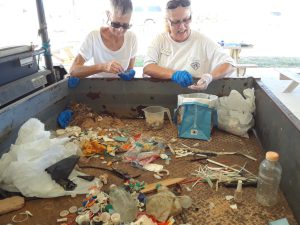
The International Coastal Cleanup is a worldwide beach cleanup event organized annually by the Ocean Conservancy and enacted locally by local organizations and passionate individuals. This cleanup not only gets thousands of volunteers out on the beaches to remove millions of pounds of trash every year, but also collects data on the types of debris collected. These data help us understand the largest contributors to ocean pollution, which can help fuel policy changes and local action.
How can I participate in the International Coastal Cleanup?
This year’s International Coastal Cleanup will take place on the morning of Saturday, September 17, 2022.
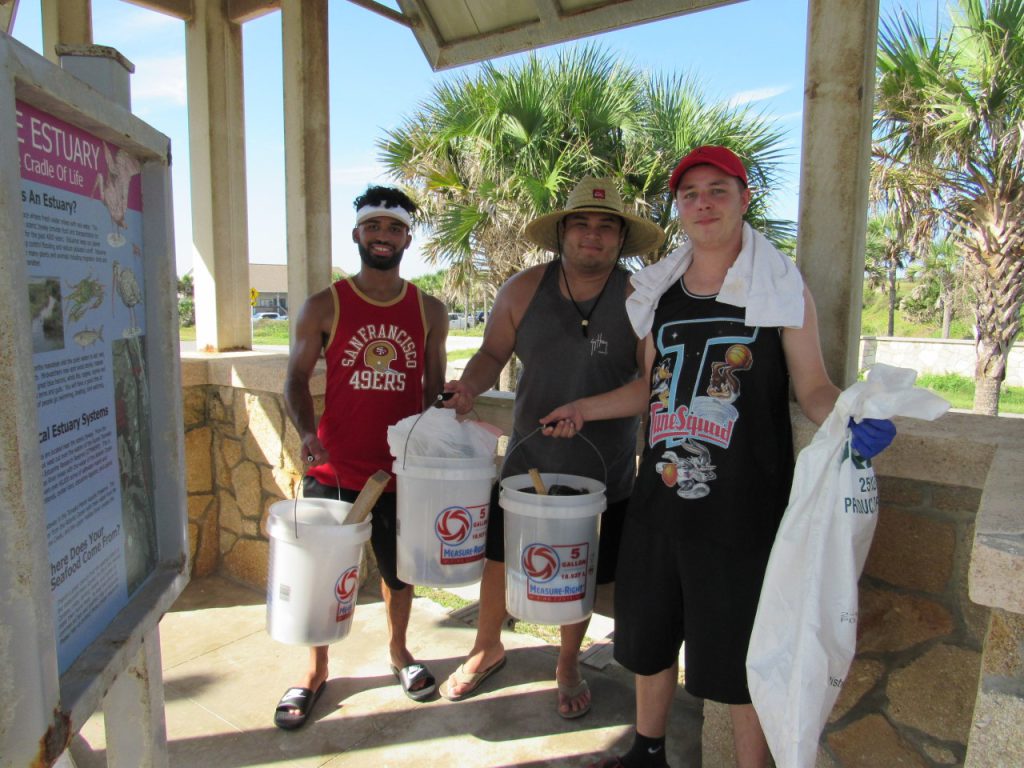
Flagler County: Visit www.A1ABeachCleanup.org to register for the cleanup at several beaches in Flagler County or call 386-517-2086 to register at Gamble Rodgers State Park, which will provide free entry for participating volunteers.
Volusia County: Visit www.volusia.org/cleanup for information and locations. Registration is now closed for the year, but you can still bring your own cleanup supplies and join in! You can also participate in the cleanup at the Canaveral National Seashore Apolo Beach – call (386) 428-3384 ext 0 for more information.
Other counties in Florida, other states, or anywhere in the world: Check out the International Coastal Cleanup map for organized cleanups in your area.
No matter where you are, you can also participate in the ICC on your own by downloading their Clean Swell app, grabbing a bucket and gloves, and heading out to your favorite beach with some friends!
What else can I do to help with plastic pollution?
Rethink your consumer practices. Before you purchase a new item, think: Do I need this? Can I borrow it, buy it secondhand, or fix something I already have?
Change the consumer culture by supporting businesses and products that don’t rely on single-use plastics. Try out laundry detergent sheets or shampoo bars. Support restaurants that provide compostable containers for take-away by leaving them positive reviews. If your favorite restaurant is still using Styrofoam or plastic, talk to them about it using this restaurant’s guide to reducing plastic.
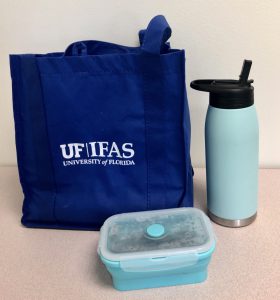
Reduce your use of plastic items. Avoid single-use plastics by getting into the habit of always carrying your reusable water bottle, shopping bags, cutlery, and Tupperware. The hardest part of this is making a new habit, so try to get someone else in your family involved so you can remind each other before leaving the house!
Cigarette butts are the number one item found on beaches – if you know someone that smokes, educate them that cigarette filters are made from plastic and so cigarette butts are not biodegradable. Make sure to properly dispose of cigarette butts in trash cans, with a pocket ash tray, or take advantage of the free recycling program through TerraCycle.
Learn what you can recycle in your area. Each municipality can be different, even within the same county. Many municipalities have cut back their recycling programs because they are not cost effective due to a decreased demand and because the products need to be properly sorted and clean. “Wish-cycling,” or putting something in the recycling bin in the hopes that it will be recycled often ends up contaminating a load of recyclables, therefore having the opposite effect and reducing what actually gets recycled!
Some things to keep in mind with your recycling:
- Make sure the items are clean
- Cardboard often needs to be broken down into 2×2 size pieces (check with your municipality)
- Lids on or off? Usually off, but it depends on your provider so check!
- Plastic bags and Styrofoam are never accepted in curbside recycling, but they are at many grocery stores. Check the bins in front of your local grocery!
- Which numbers of plastics are accepted? Some curbside programs accept all plastics (numbers 1-7), which others only accept 1-2 or 1-5.
Know what you can recycle in your municipality! It may differ if you are in the unincorporated county or part of a city. Below are tables of what can be recycled throughout Flagler and Volusia Counties as of September 2022. Please check in with your local municipality as these may change over time.
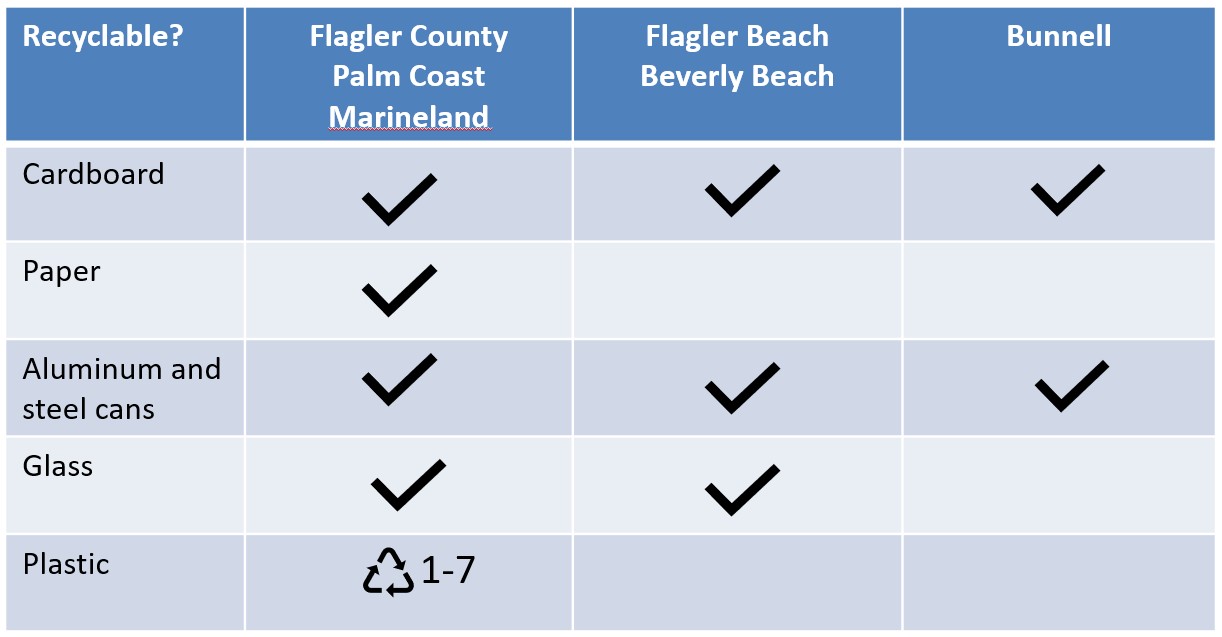
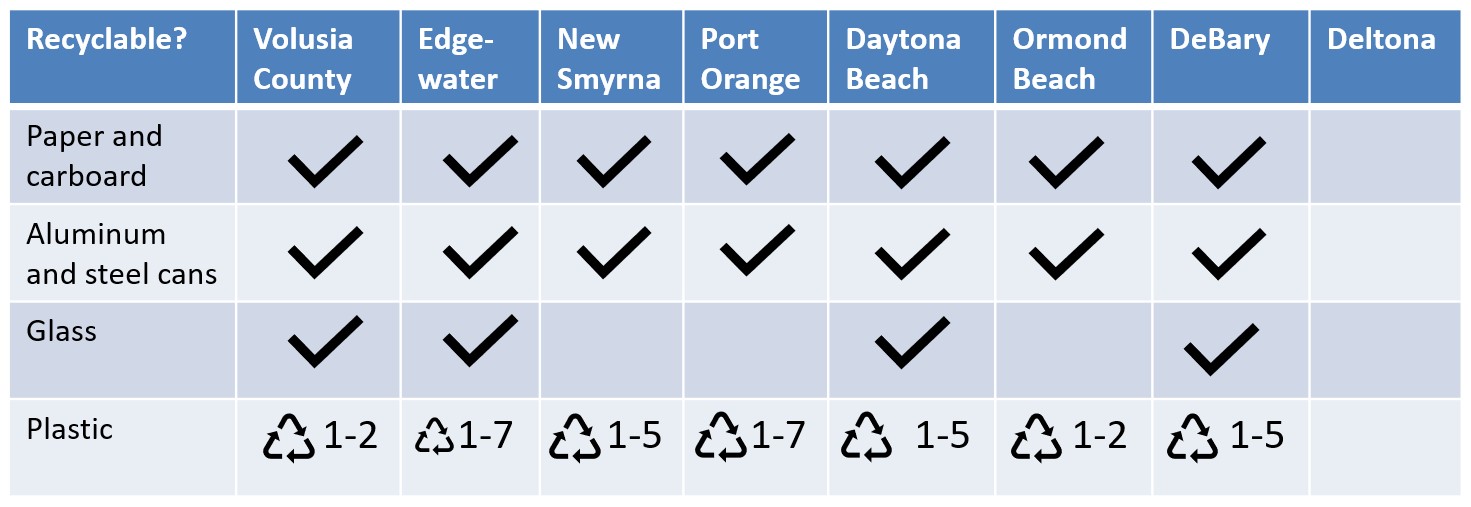
Three of the most successfully recycled items are plastic type 1 (drink bottles), aluminum cans, and steel cans. If you use these items, please be sure to rinse and recycle them, but also remember the best way to keep trash out of our oceans is to not have it exist in the first place.
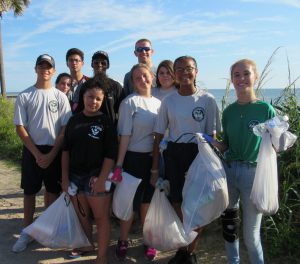
Talk with your family and friends about what each of you already do and set goals with one another to adopt some of the measures described above that are new to your routine. We can change consumerism culture by changing our behaviors and habits. As more people change their behavior, the social norms change, and industry will have to pay attention.
I hope you get out on International Coastal Cleanup day, but also remember you can help clean up the beach (or any space you see!) any time you spend time outdoors and that you can help propel the changes in your community to reduce plastic use to start with.



